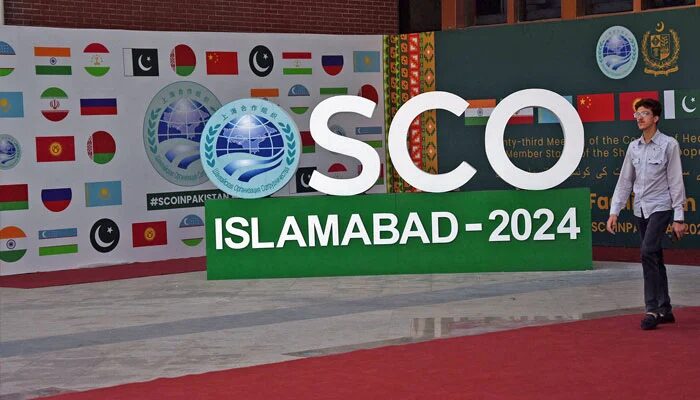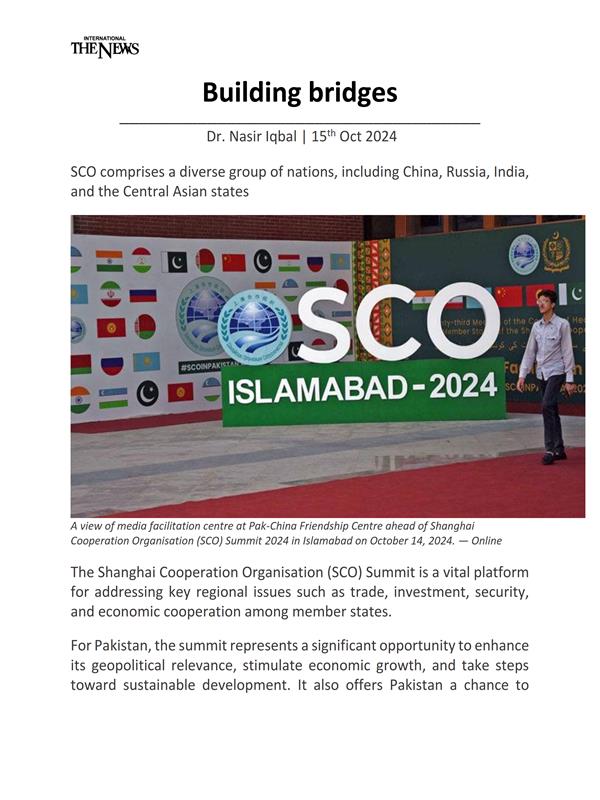
Pakistan Institute of Development Economics
- Home
Our Portals
MenuMenuMenuMenuMenuMenuMenu - ResearchMenuMenuMenuMenuMenuMenuMenu
- Discourse
- The PDR
- Our Researchers
- Academics
- Degree Verification
- Thesis Portal
- Our Portals
Building bridges
SCO comprises a diverse group of nations, including China, Russia, India, and the Central Asian states

A view of media facilitation centre at Pak-China Friendship Centre ahead of Shanghai Cooperation Organisation (SCO) Summit 2024 in Islamabad on October 14, 2024. — Online
The Shanghai Cooperation Organisation (SCO) Summit is a vital platform for addressing key regional issues such as trade, investment, security, and economic cooperation among member states.
For Pakistan, the summit represents a significant opportunity to enhance its geopolitical relevance, stimulate economic growth, and take steps toward sustainable development. It also offers Pakistan a chance to present its vision for regional prosperity, focusing not only on growth but also on the well-being of its population and neighboring countries.
The SCO comprises a diverse group of nations, including China, Russia, India, and the Central Asian states. The inclusion of Pakistan and India as full members has further amplified the geopolitical importance of the organisation.
For Pakistan, regional peace is of paramount importance, particularly in light of challenges posed by instability in Afghanistan, cross-border terrorism, and evolving threats such as cyber warfare. The summit provides an opportunity for Pakistan to engage in meaningful dialogues with its regional partners on security cooperation and intelligence-sharing. These discussions can help strengthen Pakistan’s security posture while contributing to regional stability. Emerging threats, such as cybersecurity, the rise of extremism, and climate-related risks, should also be central to the security agenda during this summit.
The organisation provides Pakistan access to a vast market with substantial trade potential. The summit serves as a platform to strengthen economic cooperation with key partners like China and Russia, while also leveraging the benefits of initiatives such as the China-Pakistan Economic Corridor (CPEC). Pakistan’s trade ties with SCO member states have been steadily growing, but the potential remains largely untapped, particularly in the services sector.
Pakistan should focus on promoting trade in services, where it has significant potential. The country’s burgeoning IT sector, for instance, has seen rapid growth in recent years, with IT exports crossing $3 billion annually. This sector holds immense potential for expansion, and Pakistan can propose agreements that facilitate IT services, banking, and financial consulting across SCO countries.
To enhance its position, Pakistan should actively showcase its talent in information technology, finance, education, and tourism as valuable service exports that can contribute to the region’s economic diversification.
Pakistan’s services sector is a crucial pillar of its economy, contributing nearly 60 per cent to its GDP. However, much of the sector’s potential remains untapped in international trade, particularly within the SCO framework. At the summit, Pakistan can propose an agenda focused on enhancing trade in services, specifically in areas where it has competitive advantages such as IT, education, and healthcare.
By presenting specific initiatives to streamline the export of services to SCO nations, Pakistan can push for regional agreements on easier cross-border digital trade, skill exchange programs, and improved regulatory alignment. These measures would help integrate Pakistan’s services sector more deeply into regional markets and attract foreign direct investment (FDI) into its high-potential industries. CPEC continues to be a key driver of economic growth and infrastructure development in Pakistan. However, its significance goes beyond merely enhancing Pakistan’s infrastructure; it strengthens Pakistan’s strategic role in the region. The SCO meeting provides an ideal platform to discuss how CPEC and similar projects can be aligned with the SCO’s broader economic and strategic objectives.
As Pakistan seeks to play a larger role in the SCO, it must focus on positioning itself as a regional hub for trade and logistics, connecting Central Asia, South Asia, and the Middle East. This strategic vision would allow Pakistan to enhance its standing in the region and gain from China’s increasing influence.
In today’s global landscape, sustainability has become an essential aspect of any forward-looking economic strategy. At the summit, Pakistan could present itself as a proponent of green technology and sustainable practices. The country has significant potential in renewable energy, particularly solar and wind power. By incorporating these sustainable energy sources into its development plans, Pakistan can attract environmentally conscious FDI, particularly from countries like China, which are looking to invest in green projects as part of their Belt and Road Initiative.
Pakistan can also propose a new economic model that promotes regional prosperity rather than merely focusing on regional growth. Unlike traditional growth models that emphasise GDP expansion, a prosperity-based approach would highlight human development, inclusivity, and equitable resource distribution. Pakistan can push for policies that ensure economic benefits reach all segments of society, advocating for investments in education, digital infrastructure, and sustainable development across SCO member states. This model would not only help uplift vulnerable communities but also foster long-term regional stability.
Pakistan has a growing IT sector and digital economy that could play a transformative role in the region. At the summit, the country should advocate for the creation of an inclusive digital economy within SCO countries. By promoting policies that facilitate digital infrastructure, online education, and digital banking services, Pakistan can help create a more connected and inclusive region. This approach would benefit rural and underdeveloped areas, fostering innovation and entrepreneurship while reducing economic inequality.
Lastly, Pakistan could champion the development of sustainable regional value chains, focusing on agriculture, renewable energy, and manufacturing. By working together, SCO countries can build a regional economy that supports each other’s industries, reduces external dependencies, and promotes mutual growth.
Pakistan’s fertile lands, untapped natural resources, and large domestic market of over 250 million people make it an attractive destination for investment in agriculture and corporate farming. With an increasingly educated labour force, Pakistan can offer SCO countries a skilled workforce, making it a valuable partner in regional development.
As Pakistan continues its participation in the SCO, the role of its leadership will be crucial. Building on past initiatives, the leadership must work toward aligning Pakistan’s economic and strategic interests with the changing dynamics of the region.
A proactive approach is needed to attract foreign investment, create jobs, and ensure that Pakistan remains an integral part of the region’s future prosperity. By pushing for comprehensive economic reforms, green technology integration, and regional collaboration, Pakistan can position itself as a leader in the SCO and play a pivotal role in shaping the region’s economic future.



